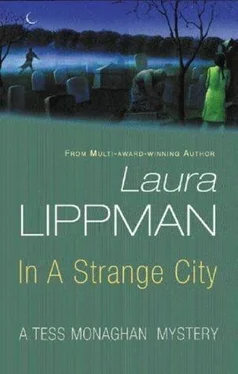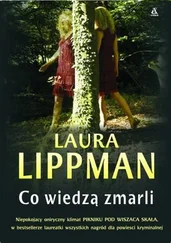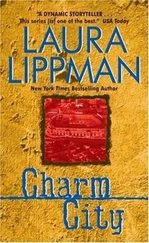Tess decided to spend the next day doing some-thing truly novel-trying to earn a buck or two. After all, she had the day free. She couldn’t call on the two men who had been burglarized until the evening, given that she didn’t know where they worked.
Besides, she needed to make some money. And she had learned that getting people to pay what they owe was often the hardest part of her job.
She began with a visit to her biggest deadbeat, a fish-market owner who called himself Fuzzy, Fuzzy Iglehart. Tess preferred Mr. Iglehart, despite his repeated invitations to use his nickname. He didn’t call Tess anything, except for the occasional “girlie” or the Baltimore-generic “hon.” That was before he had stopped returning her calls two months ago. When he saw her coming down the aisle at Cross Street Market a little after 11 a.m., he looked around to see if there was an exit handy. There was, but the narrow side aisle was blocked by two elderly shoppers, so he sighed and stood his ground.
“How you been?” he asked Tess, as if they were old friends.
She countered with a more relevant question. “How’s business?”
“Awful,” he said. “Just awful. It’s where they got me, in this dark little corner, away from all the other fish guys. I don’t know who I pissed off, but someone has it in for me. Someone at the city, or in the management here.”
Fuzzy Iglehart began almost every conversation this way, telling her his troubles, proclaiming the city, the state, the world, and all their bureaucracies to be in league against him. When he had come to Tess’s office last summer, he appeared to have a point. A rubbery-limbed man had staged a spectacular slip-and-fall in front of Fuzzy’s Fish and tried to sue the city, only to find its liability was capped. So he had gone after the next pocket, Fuzzy’s insurance company, but the agent wiggled off the hook by pointing out the puddle was caused by a faulty refrigeration unit. Ah, but the manufacturer of the refrigeration unit noted Fuzzy had not installed it properly, thus voiding its warranty.
As in the old children’s game, the Farmer in the Dell, the cheese stood alone. Terrified of the legal fees that even a successful case might cost him, Fuzzy had a rare moment of clarity: He decided to confirm that the injured party was, in fact, an injured party. Within forty-eight hours of being hired, Tess had videotaped Mr. Slip-and-Fall building a brick patio in his backyard. She sent the would-be plaintiff a cassette, along with a short note explaining the penalties for criminal fraud in Maryland, and the case abruptly vanished from the docket.
That had been Labor Day and Fuzzy Iglehart had been her best friend, promising her free fish and a fix-up with his son, Fuzzy Jr., both of which she politely declined. Still, Fuzzy Iglehart had continued to proclaim he would do anything for Tess, absolutely anything.
Except, it seemed, pay her.
“January’s bad,” he said, launching into his usual litany of woe, his eyes fixed on some spot beyond her left shoulder. “It’s always bad, but it’s worse than ever this year.”
“You said last month that all you needed to do was get through Christmas and you’d be able to pay me.”
“Christmas was terrible this year. So cold.”
“It was one of the warmest Decembers on record.”
“See, that’s what I mean. Too warm. Who wants to eat oyster stuffing when it’s so warm out? Look, how about I give you a credit for what I owe you, give it to you in goods?”
“Because, as I told you last month and the month before that, I hate fish and I’m allergic to shellfish.”
“And you from Baltimore. Okay, how about I give you one of those old oyster tins? They’re very decorative. I got another one around here. They’re worth a lot. I seen it on eBay.”
“You gave me one of those in November and told me you’d make good after Thanksgiving.”
“But you like that kind of stuff, right? Old Baltimore stuff, I mean. You got that weird clock in your office, I remember. Fuzzy has a good memory.” He tapped his fuzzless forehead, retreated into a small storage area behind his stall, and returned with a row of stadium or auditorium chairs, four in all and extremely used.
“I got these from Memorial Stadium,” he said. “The president of the United States sat in them on Opening Day.”
“Which president?” Tess asked. “Which opening day?”
“Well, one of them. Christ, I don’t know.”
“All the seats from Memorial Stadium were removed under supervision and sold at auction last spring, in preparation for the demolition. Did you buy those?”
“Um, well, a guy… a guy gave ‘em to me, as a gift.”
“Where did he get them?”
“I guess he bought them.”
“The seats are cloth and they’re stamped school #201 on the back.”
Fuzzy looked, feigning amazement. “What do you know?”
Tess sighed. It was a given in her line of work that sometimes the client was as big a cheat as the person she was asked to expose. You had to be capable of thinking like a rip-off artist before you could imagine catching one. In fact, most of her clients were a little bent. She wondered if other private detectives had the same problem. Gretchen O’Brien, for example, with her no-doubt-shiny office and her claims to professionalism.
“I don’t want a row of old school auditorium seats. I don’t want another oyster tin-”
“How about an old Park’s Sausage sign, for that weird dog of yours?”
Now that was tempting, even if her dog was named for the other local pork product. She heard the old commercial in her head and felt a twinge of nostalgia. More Park’s sausages, Mom-puh-leeze? But no, she had to be firm.
“I want money, Mr. Iglehart. Cash, or a certified check, because you bounced a check to me in September, remember? Which is illegal, by the way. I could have taken out a complaint on you then.”
“I had an awful summer. Awful. Sometimes I think there ain’t no fish left in that bay.”
Tess thought the problem might be as simple as his stand’s name. Even if one wasn’t ichthyophobic, fuzzy fish didn’t inspire confidence. But she was in no mood to offer marketing tips to the small-business man.
“I’ll give you until February first, and then I’m going to have to call a bill collector. Which means I get less money, and then I’m going to be really pissed off. In fact, I may take a tumble right here, to make up the shortfall.”
She pointed at the puddle next to the refrigeration unit with the toe of her suede boot, careful not to make contact. “You could at least get that fixed. Haven’t you learned anything from all this?”
“Can’t afford it,” Fuzzy said mournfully.
Tess walked down the aisle, glad to be away from the morose stares of the dead fish on ice. How did people eat things with scales? Not to mention oysters, mussels, clams-and crabs. Crabs were the worst. Had anyone in Baltimore ever taken a hard look at its unofficial mascot? Tess was thankful for the excuse of her allergies. Otherwise, she would have been forced almost daily to justify her instinctive aversion to shellfish. She wondered if there was some contrary little girl up in Hershey, Pennsylvania, grateful to be lactose-intolerant because it got her off the hook for eating chocolate.
But Tess needed only a few steps for her appetite to revive. It was almost lunchtime, by her stomach, if not by the clock. She stopped at a sandwich stand and ordered a turkey sub, a bag of sour-cream-and-onion Utz potato chips, and a sixteen-ounce Coca-Cola, frowning when the counterman asked, “You mean a Diet Coke?”
“Regular,” she growled, miffed by the assumption that all women drank diet cola. “And extra hots on the sub.”
Читать дальше












